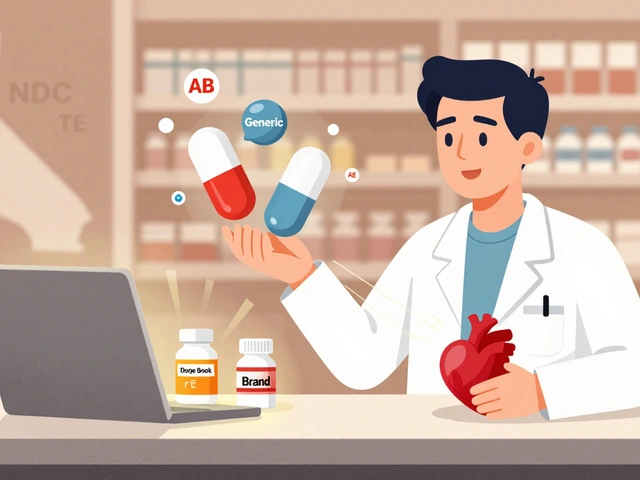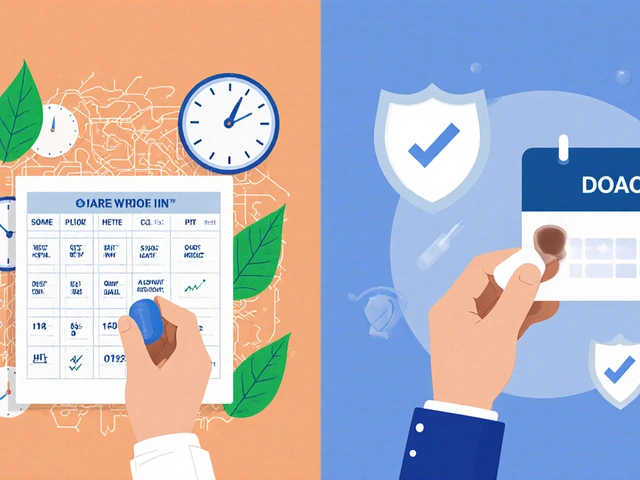Nighttime Medication Guide: How to Take Your Pills Before Bed
Ever wonder why some doctors tell you to pop a pill right before you hit the pillow? It’s not just a random suggestion – the time of day can change how a drug works. In this guide we’ll walk through what to think about when you take medication at night, which meds are usually bedtime‑friendly, and how to avoid common pitfalls.
Why Timing Matters at Night
Our bodies run on a 24‑hour clock called the circadian rhythm. Hormones, blood pressure, and liver enzymes all shift as the day goes on. Some drugs need the lower nighttime metabolism to work best, while others can make you feel jittery if taken too late. For example, antihistamines like diphenhydramine help you sleep because they block the brain’s wake‑up signals, whereas stimulant‑type meds for ADHD can keep you wired if you take them after dinner.
Another factor is the risk of side‑effects while you’re unconscious. A blood‑pressure pill that drops too low could cause dizziness when you stand up in the middle of the night. Knowing a drug’s peak‑time helps you choose the right hour – often 30‑60 minutes before you plan to fall asleep.
Tips for Safe Nighttime Dosing
1. Follow the label, then double‑check. The prescription or OTC label usually says “take with food” or “take at bedtime.” If it’s vague, a quick call to your pharmacist clears things up.
2. Keep a consistent schedule. Your body gets used to a routine. Try to take the same pill at the same time each night, even on weekends.
3. Pair with a glass of water. Water helps the tablet dissolve and reduces the chance of throat irritation. Avoid alcohol or caffeine right before bed – they can interfere with absorption.
4. Watch for interactions. Some nighttime meds, like certain statins, are meant for the evening because cholesterol production spikes overnight. But mixing them with a sleep aid can magnify drowsiness. Use a medication list app or write down everything you’re taking.
5. Store meds properly. Keep them in a cool, dry place, away from the bedside lamp that can warm up plastic bottles. Heat can break down some ingredients, making them less effective.
6. Know the red flags. If you wake up feeling unusually light‑headed, confused, or have a pounding heart, stop the night dose and call your doctor. Those signs often mean the timing is off.
Common bedtime‑friendly meds include:
- Melatonin and other sleep aids
- Night‑time antihistamines (e.g., diphenhydramine)
- Certain blood‑pressure drugs (e.g., ACE inhibitors)
- Statins that target nighttime cholesterol production
- Some anti‑anxiety medications prescribed for evening use
On the flip side, avoid taking stimulants, some antibiotics that cause stomach upset, and diuretics right before sleep – they can make you get up in the middle of the night.
Finally, set a simple reminder. A phone alarm labeled “meds” or a sticky note on your nightstand works wonders. The goal is to make the habit effortless so you don’t skip a dose or take it at the wrong hour.
By paying attention to when you take your medicine, you can boost its effectiveness, cut down side‑effects, and enjoy a smoother night’s rest. Got a specific drug you’re unsure about? Jot it down and ask your pharmacist – they love that kind of question.
Bed-Wetting Solutions: Effective Ways to Sleep Through the Night
No one likes waking up in soggy sheets, but bed-wetting happens to more kids and even some adults than you'd think. This article covers why it happens, busts a few stubborn myths, and offers straightforward solutions that actually make a difference. You’ll get clear, doable tips on changing habits, using products, and working with your doctor when it’s needed. We’ll even look at how to handle the emotional side, so you don’t feel alone with this issue. Ready for better sleep and dry mornings?






